Serving 497 students in grades Prekindergarten-5, Oakhurst Elementary School ranks in the top 50% of all schools in Texas for overall test scores (math proficiency is top 50%, and reading proficiency is top 50%).
The percentage of students achieving proficiency in math is 47% (which is higher than the Texas state average of 41%). The percentage of students achieving proficiency in reading/language arts is 47% (which is lower than the Texas state average of 51%).
The student:teacher ratio of 16:1 is higher than the Texas state level of 14:1.
Minority enrollment is 97% of the student body (majority Hispanic), which is higher than the Texas state average of 75% (majority Hispanic).
Quick Stats (2025)
- Grades: Prekindergarten-5
- Enrollment: 497 students
- Student:Teacher Ratio: 16:1
- Minority Enrollment: 97%
- Overall Testing Rank: Top 50% in TX
- Math Proficiency: 47% (Top 50%)
- Reading Proficiency: 47% (Btm 50%)
- Science Proficiency: 15-19% (Btm 50%)
- Source: National Center for Education Statistics (NCES), TX Dept. of Education
School Overview
Oakhurst Elementary School's student population of 497 students has declined by 15% over five school years.
The teacher population of 31 teachers has declined by 16% over five school years.
Grades Offered
Grades Prekindergarten-5
Total Students
497 students
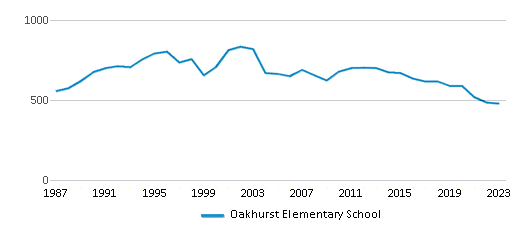
Gender %
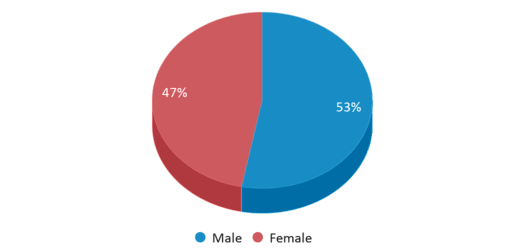
Total Classroom Teachers
31 teachers
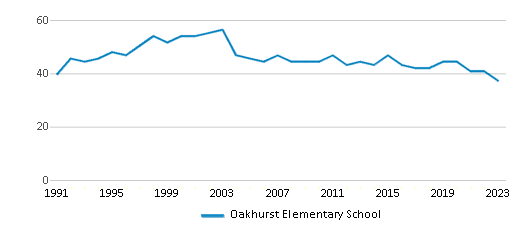
Students by Grade
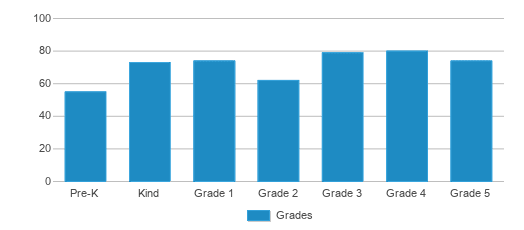
School Rankings
Oakhurst Elementary School ranks within the top 50% of all 8,188 schools in Texas (based off of combined math and reading proficiency testing data).
The diversity score of Oakhurst Elementary School is 0.15, which is less than the diversity score at state average of 0.64. The school's diversity has stayed relatively flat over five school years.
Overall Testing Rank
#3557 out of 8188 schools
(Top 50%)
(Top 50%)
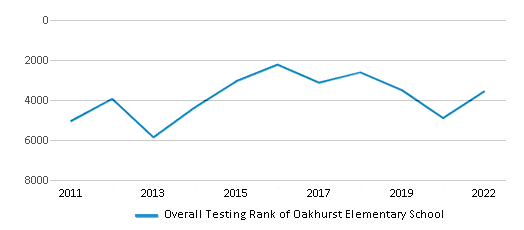
Math Test Scores (% Proficient)
47%
41%
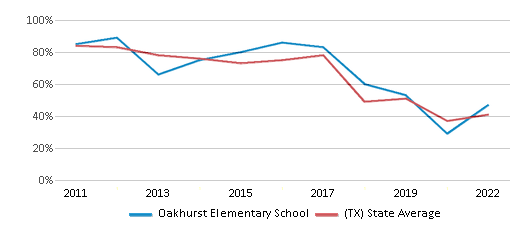
Reading/Language Arts Test Scores (% Proficient)
47%
51%
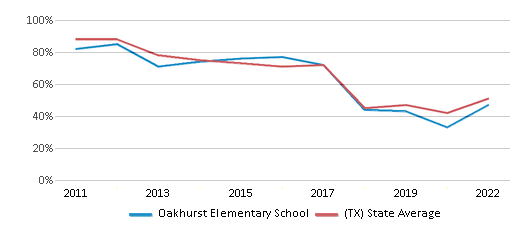
Science Test Scores (% Proficient)
15-19%
46%
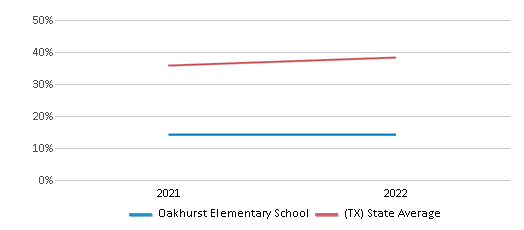
Student : Teacher Ratio
16:1
14:1
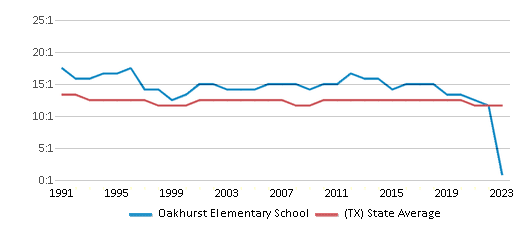
American Indian
n/a
n/a
Asian
n/a
6%
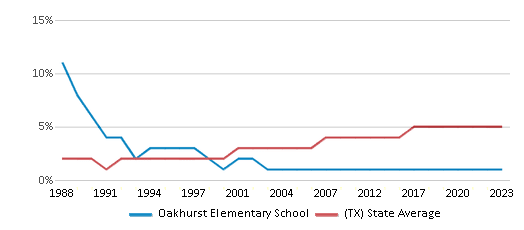
Hispanic
92%
53%
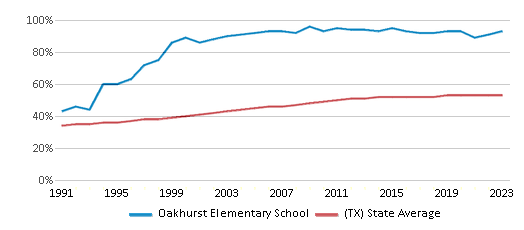
Black
4%
13%
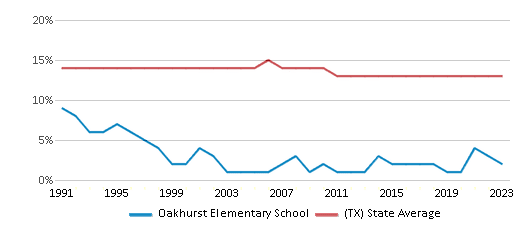
White
3%
25%
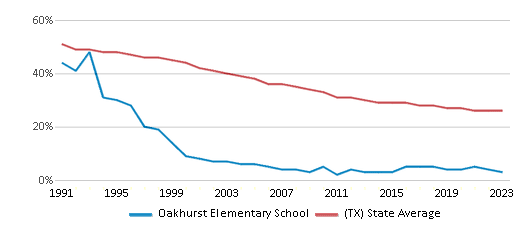
Hawaiian
n/a
n/a
Two or more races
1%
3%
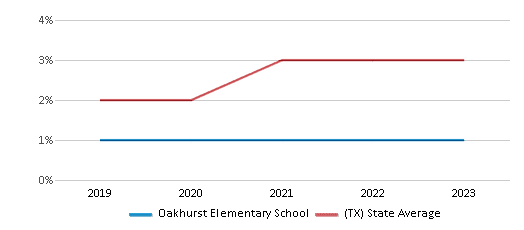
All Ethnic Groups
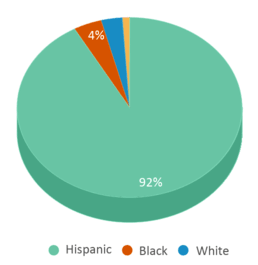
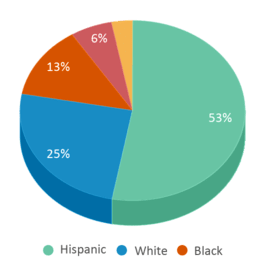
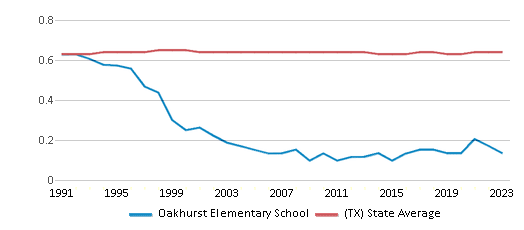
Participates in the National School Lunch Program (NSLP)
Yes
Eligible for Free Lunch
80%
57%
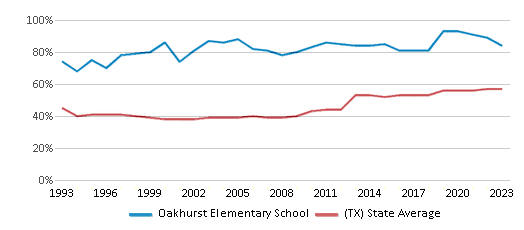
Eligible for Reduced Lunch
6%
5%
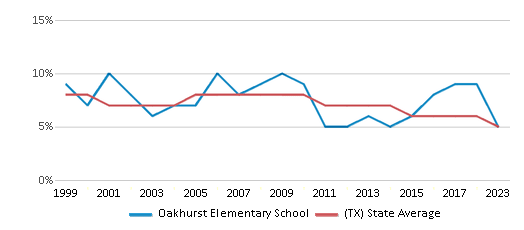
School Statewide Testing
School District Name
Source: National Center for Education Statistics (NCES), TX Dept. of Education
Profile last updated: 02/09/2025
Frequently Asked Questions
What is Oakhurst Elementary School's ranking?
Oakhurst Elementary School is ranked #3557 out of 8,188 schools, which ranks it among the top 50% of public schools in Texas.
What schools are Oakhurst Elementary School often compared to?
Oakhurst Elementary Schoolis often viewed alongside schools like Riverside Applied Lrn Center by visitors of our site.
What percent of students have achieved state testing proficiency in math and reading?
47% of students have achieved math proficiency (compared to the 41% TX state average), while 47% of students have achieved reading proficiency (compared to the 51% TX state average).
How many students attend Oakhurst Elementary School?
497 students attend Oakhurst Elementary School.
What is the racial composition of the student body?
92% of Oakhurst Elementary School students are Hispanic, 4% of students are Black, 3% of students are White, and 1% of students are Two or more races.
What is the student:teacher ratio of Oakhurst Elementary School?
Oakhurst Elementary School has a student ration of 16:1, which is higher than the Texas state average of 14:1.
What grades does Oakhurst Elementary School offer ?
Oakhurst Elementary School offers enrollment in grades Prekindergarten-5
What school district is Oakhurst Elementary School part of?
Oakhurst Elementary School is part of Fort Worth Independent School District.
In what neighborhood is Oakhurst Elementary School located?
Oakhurst Elementary School is located in the Scenic Bluff neighborhood of Fort Worth, TX.
School Reviews
2 3/23/2019
Yes a very large percentage of students are learning English. Many parents do not speak English. Having them learn the language is not on the forefront, everything is translated. The school receives funds for having such students. STARR testing is harped on, not creativity or traditional projects or learning for fun. A vast majority of students need turtoring year after year. Some children are in front of a screen all day without recess using computer programs. PTO meetings are few and far between and not keeping parents up to date. So much more...
2 8/25/2010
This school does not have any classes for kids that speak english only. Classes are either spanish or Dual Language. Dual Language classes are half day spanish and half day english. So, kids that don't speak english get a full day of education but kids that speak english get a half days education. English speaking kids are getting unfair treatment because they know the American language.... We live in America, classes should be in english and then have alternatives for nonenglish speaking kids.
Review Oakhurst Elementary School. Reviews should be a few sentences in length. Please include any comments on:
- Quality of academic programs, teachers, and facilities
- Availability of music, art, sports and other extracurricular activities
Recent Articles

What Is A Charter School?
Explore the world of charter schools in this comprehensive guide. Learn about their history, how they operate, and the pros and cons of this educational innovation. Discover key facts about charter schools, including admission policies, demographics, and funding, as well as what to look for when considering a charter school for your child.

10 Reasons Why High School Sports Benefit Students
Discover the 10 compelling reasons why high school sports are beneficial for students. This comprehensive article explores how athletics enhance academic performance, foster personal growth, and develop crucial life skills. From improved fitness and time management to leadership development and community representation, learn why participating in high school sports can be a game-changer for students' overall success and well-being.

February 05, 2025
Understanding the U.S. Department of Education: Structure, Impact, and EvolutionWe explore how the Department of Education shapes American education, from its cabinet-level leadership to its impact on millions of students, written for general audiences seeking clarity on this vital institution.





